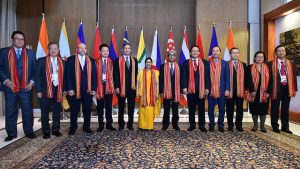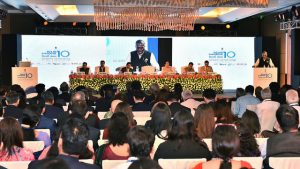
Amid the ongoing geopolitical churn in the region, India’s External Affairs Minister Sushma Swaraj has reiterated New Delhi’s commitment to shaping “an open, free and inclusive Indo-Pacific” and underlined ASEAN’s centrality in realising this vision of a region, which transcends great power rivalries.
“The Indo-Pacific must be a free, open and an inclusive region,” Mrs Swaraj said at the 10th edition of the Delhi Dialogue, India’s foremost ASEAN-centred Track 1.5 Forum, in New Delhi on July 19.
“We must follow a common, rules-based order, that takes into account the equality of all, irrespective of size and strength. It should allow use of common spaces on sea and in the air,” said the minister.
Forging and sustaining the rules-based order in the Indo-Pacific region and promoting freedom of navigation amid China’s growing assertiveness in South China Sea figured prominently on the agenda of the Shangri-La Dialogue held in Singapore on June 1. In his vision statement on the Indo-Pacific region at the Shangri-La Dialogue, Prime Minister Narendra Modi had said: “The ten countries of Southeast Asia connect the two great oceans in both the geographical and civilisational sense. Inclusiveness, openness and ASEAN centrality and unity, therefore, lie at the heart of the new Indo-Pacific.”
Against the backdrop of new challenges emerging in the maritime domain and the rise of China, the 10th Delhi Dialogue is focused on ‘Strengthening ASEAN-India Maritime Cooperation’.
Swaraj positioned the doctrine of SAGAR – Security and Growth for All in the Region – at the heart of India’s burgeoning engagement with the Indo-Pacific region.

“Our vision of the Indo-Pacific, not only involves physical inter connectivity, but also entails building bridges of trust, based on mutual respect, giving due regard for sovereignty and territorial integrity, consultation, transparency, viability and sustainability.”
“Finally, there is an imperative need to eschew protectionism, nationalism and avoid a return to great power rivalries,” she said.
Besides bolstering maritime security and connectivity, the minister also exhorted ASEAN countries to scale up investment in the world’s fastest growing major economy. “I invite companies from ASEAN countries to take advantage of these opportunities for investments in India, in numerous sectors such as smart cities, roads, highways, ports, railways, power and urban infrastructure,” said Swaraj.
With China intensifying its outreach to attract more partners to the Belt and Road project, Swaraj outlined India’s initiatives at intensifying regional connectivity with ASEAN countries.
“We hope to transform these corridors of connectivity into corridors of economic cooperation. In connectivity, India has made considerable progress in implementing the India–Myanmar–Thailand Trilateral Highway and the Kaladan Multimodal Transit Transport Project. Our recent agreement with Indonesia to develop port infrastructure in Sabang is yet another step in this direction.”
Outlining the expanding canvas of India-ASEAN partnership, the minister “ASEAN at the centre of our dream of an Asian century.”
“As Asia regains its global position for the twenty first century to be called “Asia’s Century”, it goes without saying that India and ASEAN will play a vital role in ensuring this. We look forward to working with the ASEAN Member States in order to turn this vision into a reality.”
Author Profile

- Manish Chand is Founder and Editor-in-Chief of India Writes Network (www.indiawrites.org) and India and World, a pioneering magazine focused on international affairs. He is CEO, Centre for Global India Insights, an India-based think tank focused on global affairs.
Latest entries
 India and the WorldFebruary 27, 2026Modi visit: India-Israel partnership enters a new era
India and the WorldFebruary 27, 2026Modi visit: India-Israel partnership enters a new era India and the WorldFebruary 24, 2026Unravelling Modi’s Israel journey: What to expect
India and the WorldFebruary 24, 2026Unravelling Modi’s Israel journey: What to expect India and the WorldFebruary 17, 2026South-by-South: Focus on people-centric solutions at India AI summit
India and the WorldFebruary 17, 2026South-by-South: Focus on people-centric solutions at India AI summit India and the WorldFebruary 7, 2026Modi hails interim India-US trade deal, Goyal says no concessions made on agriculture
India and the WorldFebruary 7, 2026Modi hails interim India-US trade deal, Goyal says no concessions made on agriculture







